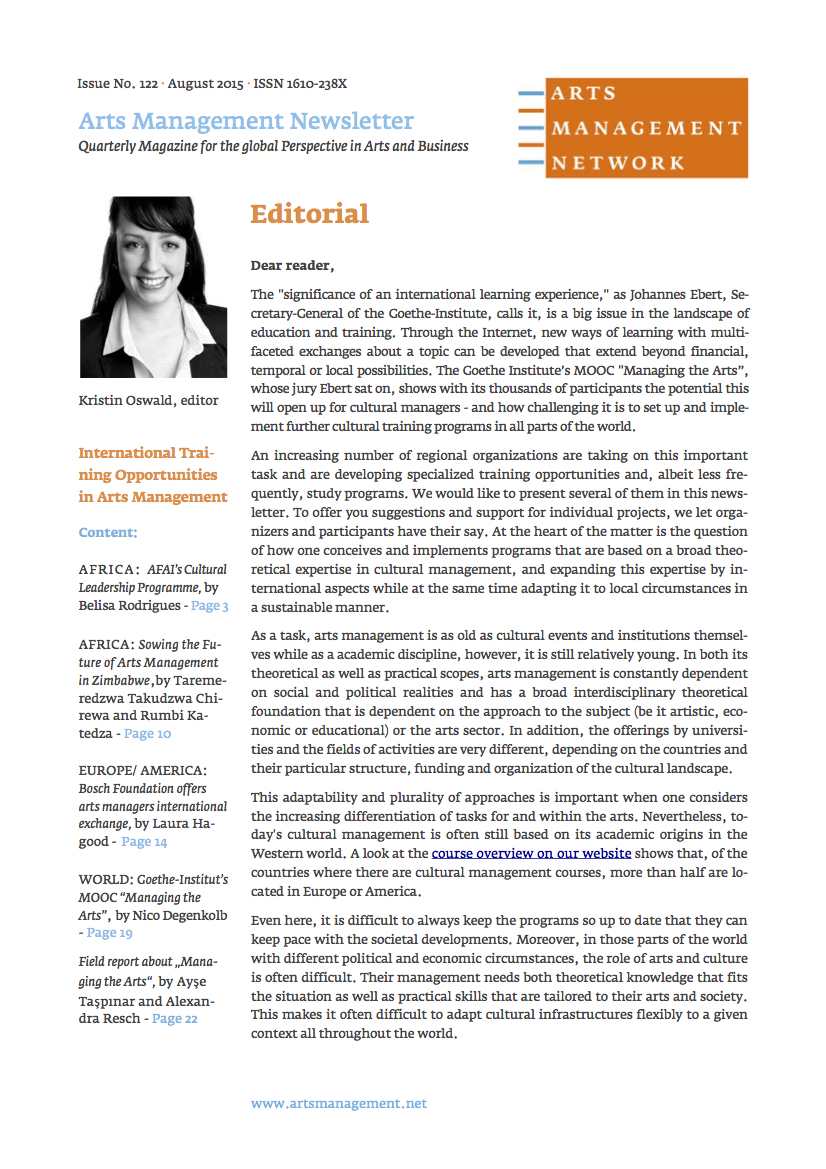Arts Management Newsletter
No 123: Perspectives on Cultural Entrepreneurship

Digitization is not only changing how arts organizations can convey cultural experiences, reach users and open up to the input of visitors. It is rather changing the way we think about the conditions and structures of day-to-day creative work. At the same time, digitization is opening up a multitude of possibilities of increasing the economic value of the arts. The field of cultural entrepreneurship is reconsidering the intersection of culture, technology and entrepreneurship. It uses the new dynamics that arise to the cultural sector to revolutionize current business models and redefine the impact of culture. Cultural entrepreneurship can be a way to reduce dependence on public funding and to position itself as an economic factor vis-à-vis politics and public without abandoning individual artistic and idealistic societal demands. As culture represents both artistic as well as social values, we do not intend to separate cultural and social entrepreneurship from each other in this newsletter, or, for that matter, from entrepreneurial thinking within the arts sector.
The co-founder of CultureLabel.com, Peter Tullin stresses that all kinds of whether inside or outside organizations [can] strive to change the world. (...) The spread of their ideas, products and platforms (...) will continue to challenge accepted wisdom and disrupt established ways of doing things." As the boom of the creative industry shows, applied creativity that extends beyond artistic products is becoming increasingly important for many fields. In addition, the Global Entrepreneurship Index makes clear the growing importance of entrepreneurship for economic and societal development in different parts of the world. That difficult conditions that stimulate the desire for change play a role here can not only be seen in the examples from Africa and Asia in this newsletter, but also examples like the Creative Startup Accelerator Costa Rica or in the principle of Jugaad Innovation from India. Here, cultural entrepreneurship serves to pursue a higher goal, to improve the realities of life of people and to use culture to cause social impact.
Therefore, cultural entrepreneurship is not just about the financial relationship between culture and economy but also about the development of new perspectives and the questioning of pre-existing structures in both areas. In this way, different approaches are attempting to anchor the economic thinking in other arts departments than management, controlling and fundraising, and, in turn, are promoting a so-called intrapreneurship, which will be introduced in the newsletter. The platform Museum Entrepreneurship or the Institute for Cultural Entrepreneurship for Museum Leaders for arts and culture professionals want to implement principles of business and entrepreneurial thinking to the creative and strategic process, and to use resources and ingenuity to develop business acumen that increases revenue and ensures self-sustainability.
There already has been a lot of research on the potential of cultural entrepreneurship for the survival of the arts as well as social innovation. With Artivate: A Journal of Entrepreneurship in the Arts, one of the first research journals specializing in the subject was established in 2012. Additionally, next to an increasing number of study programs, practical trainings are emerging for artists and arts managers in universities, organizations, or in so-called accelerators or incubators like the Impact Hub Zürich presented in the newsletter. In September 2014, the New Museum in New York established its own business incubator with New Inc. Here, participants from the creative industries as well as the museum staff are both able to benefit from synergies, mentorings and trainings. In addition, the business school KaosPilots has specialized itself to regard design from an artistic point of view as well as for management processes, value-based corporate structures or social innovation.
Thus, the task of cultural management can no longer be reduced to enabling artistic activity. Instead, it will be about demonstrating shortcomings, developing new perspectives and ways of thinking, and questioning pre-existing structures. Therefore, cultural entrepreneurship needs public demand, visions and pioneers who want to create conditions for new forms of creative work or social roles, and to apply these conditions for the purpose of society in the future. Since this needs time, teamwork, perseverance and most of all strategic proceedings, cultural managers have to become change agents whose aim is to promote purpose, provide the courage to lower internal as well as external barriers, accept new ideas and withstand setbacks. With this newsletter we hope to inspire you to create such a momentum to change the world.
Translated by Erik Dorset
Table of Contents
SPECIAL FOCUS - Perspectives on Cultural Entrepreneurship
- The Art of Fostering Intrapreneurship, by Mario Herger - Page 4
- Impact Hubs. The Culture of Entrepreneurship in Practical Terms, by Janine Fuchs and Christoph Birkholz - Page 7
- Glance on news on our website - Page 12
- Perspectives from Anglophone Africa on Cultural Entrepreneurship, by Sophia Olivia Sanan - Page 13
- Introduction to: Cultural Entrepreneurship in Africa. Routledge 2015,by Ute Röschenthaler and Dorothea Schulz (eds.)- Page 17
About Arts Management Quarterly
Are you interested in succeeding in the international arts sector? Then you need a comprehensive overview of new developments and the necessary know-how for their implementation. Arts Management Quarterly is an established digital journal aimed at the international audience. Not only does it reflect major developments in arts management and society beyond the national context, it also sheds light on regional developments and approaches that can be inspiring for the international arts sector.
Arts Management Quarterly can be obtained free of charge by email if you subscribe here:
In each issue, the journal focuses on a central topic from different perspectives to assess it in its entirety for the international arts sector. The journal also includes the series “Recommended Reading“ and “My working world“.
Arts Management Quarterly is published under a CC BY-NC-ND 4.0 license.
Find out how you can become an author of Arts Management Quarterly and give our readers insights into your work:
Previous issues can be downloaded in the archive:
There are no comments for this content yet.
similar content

